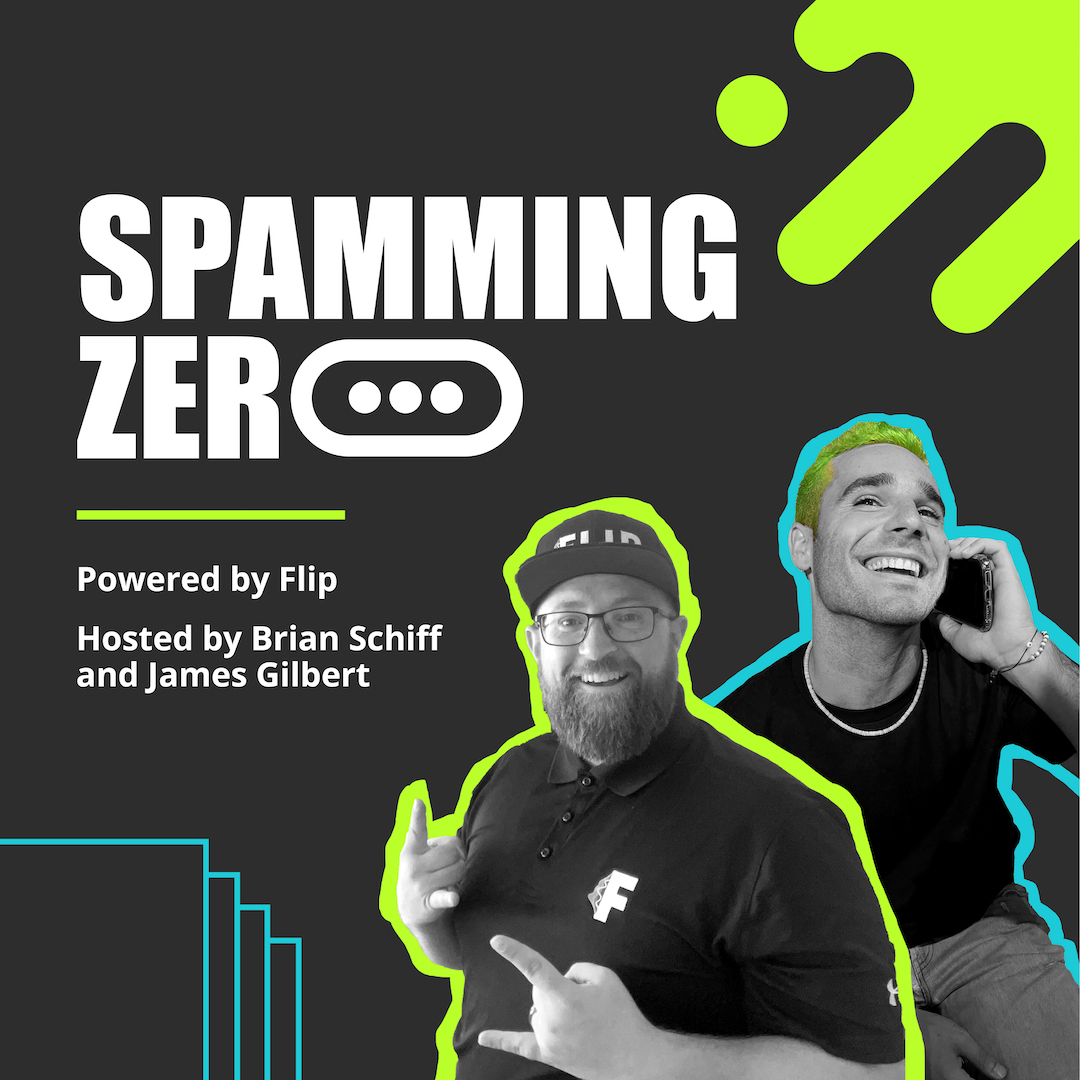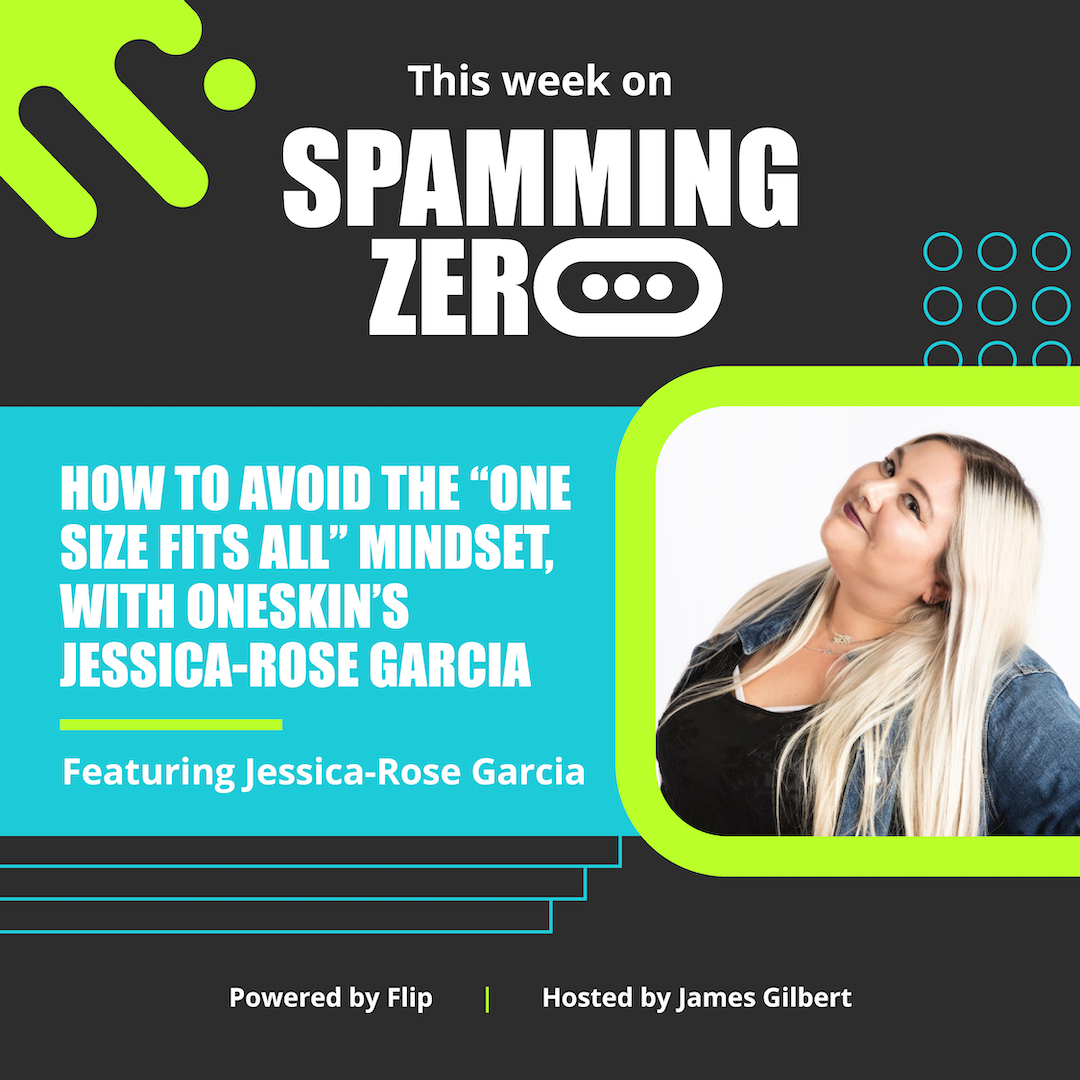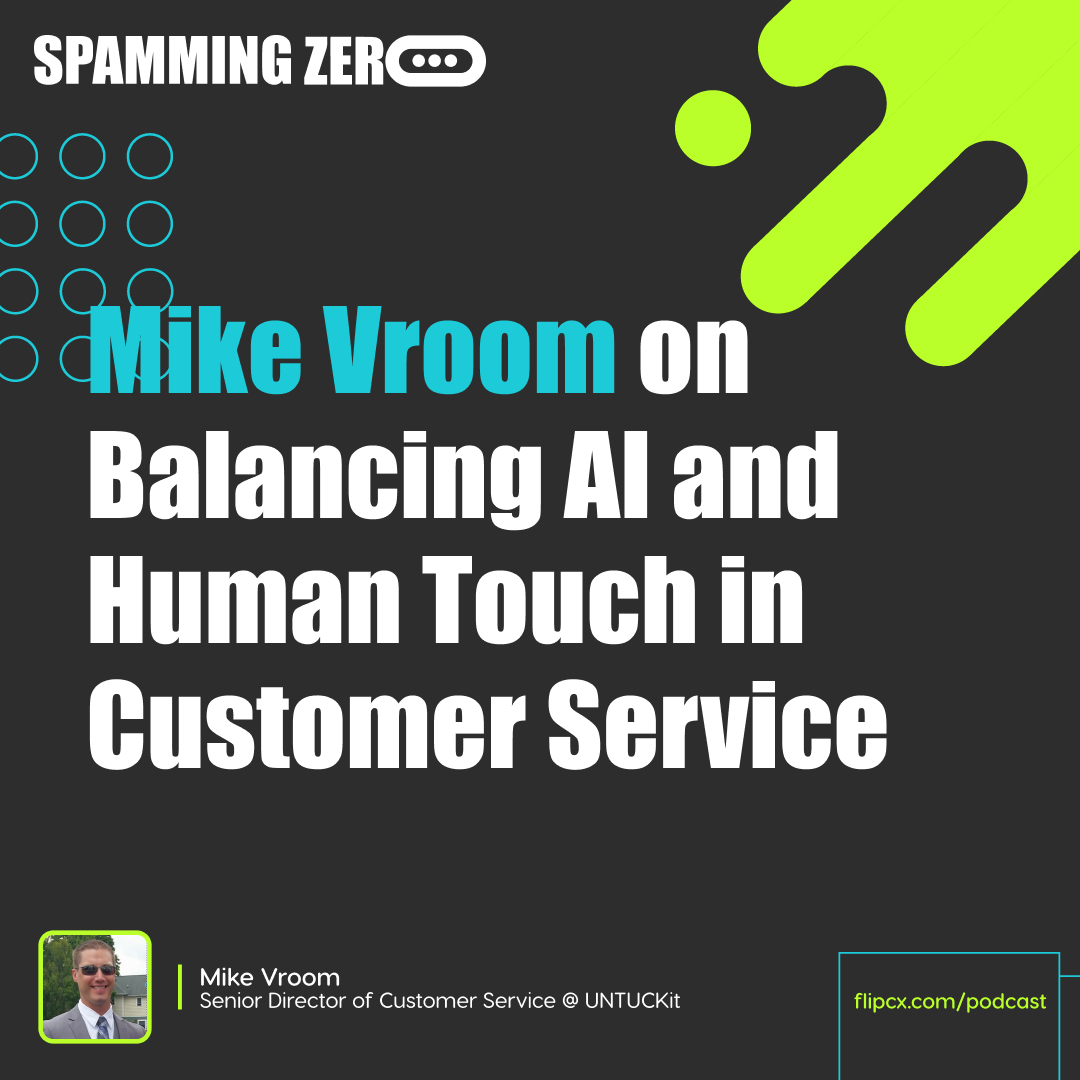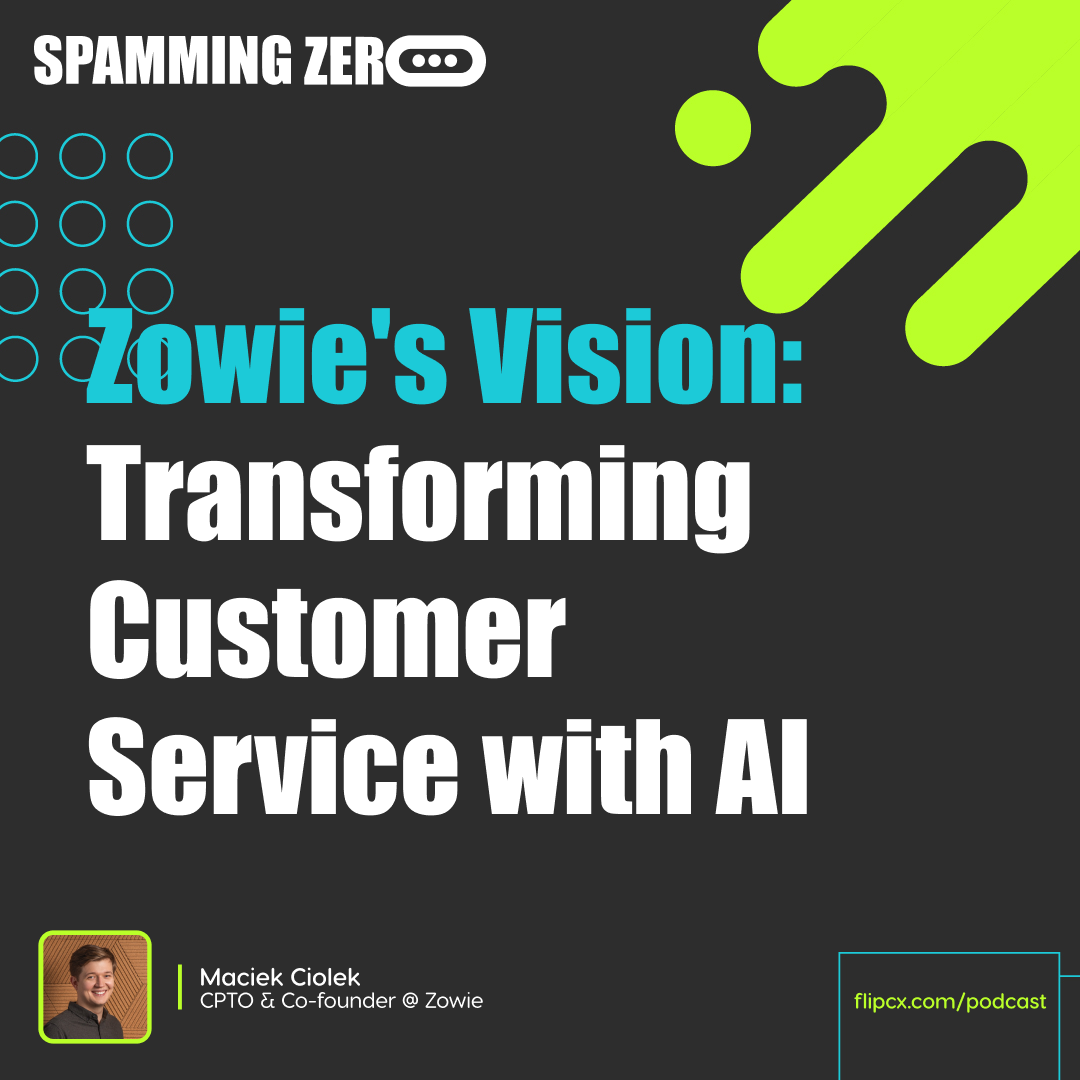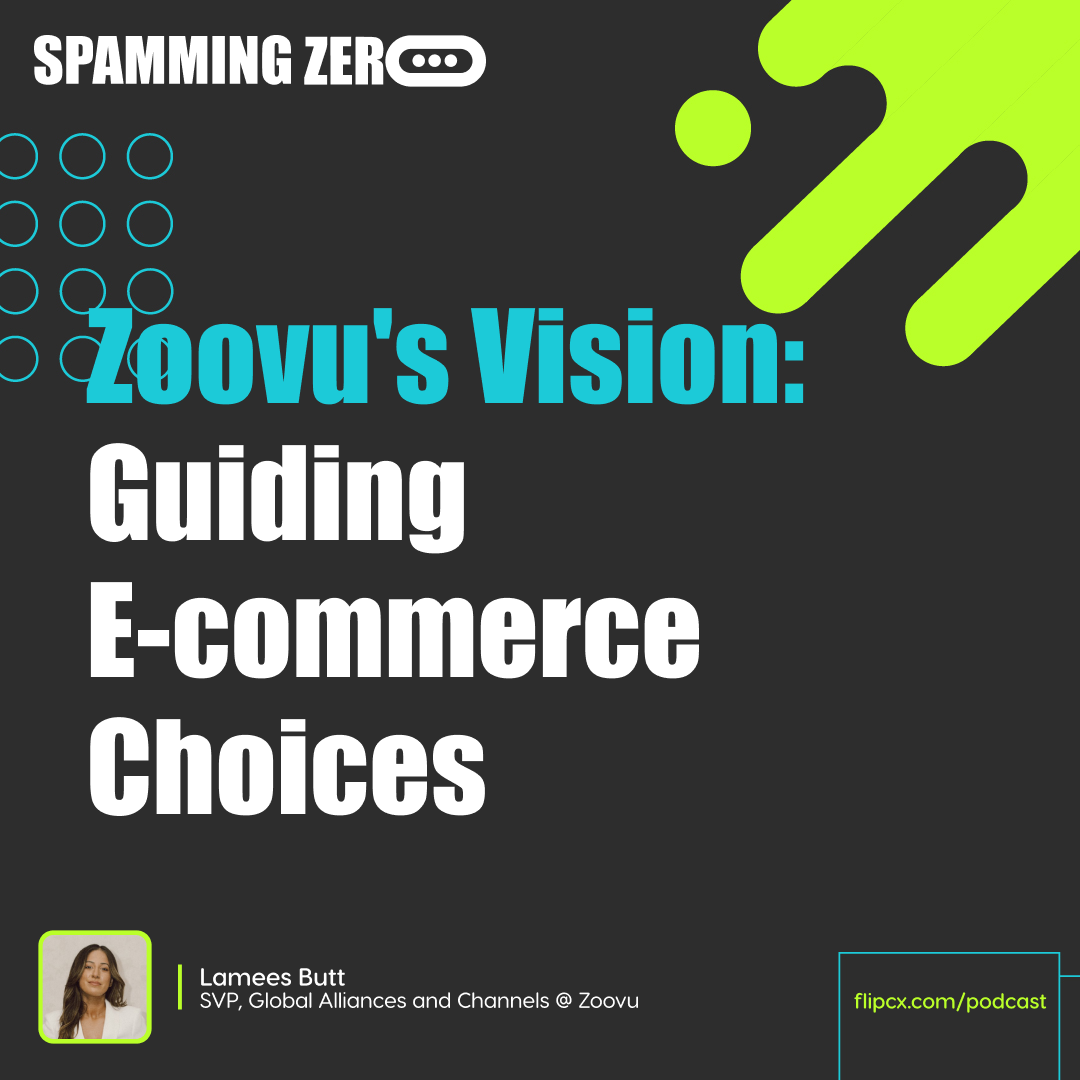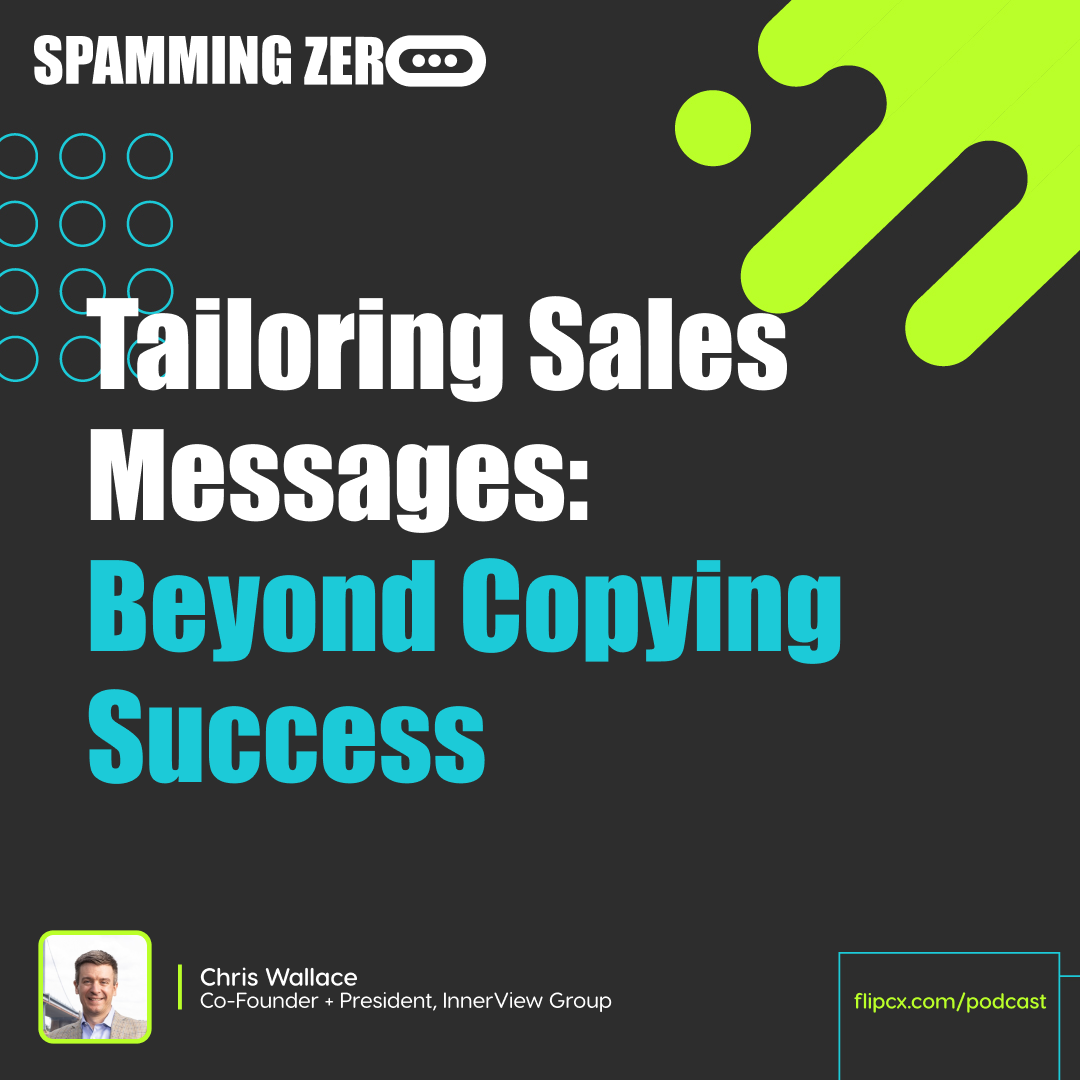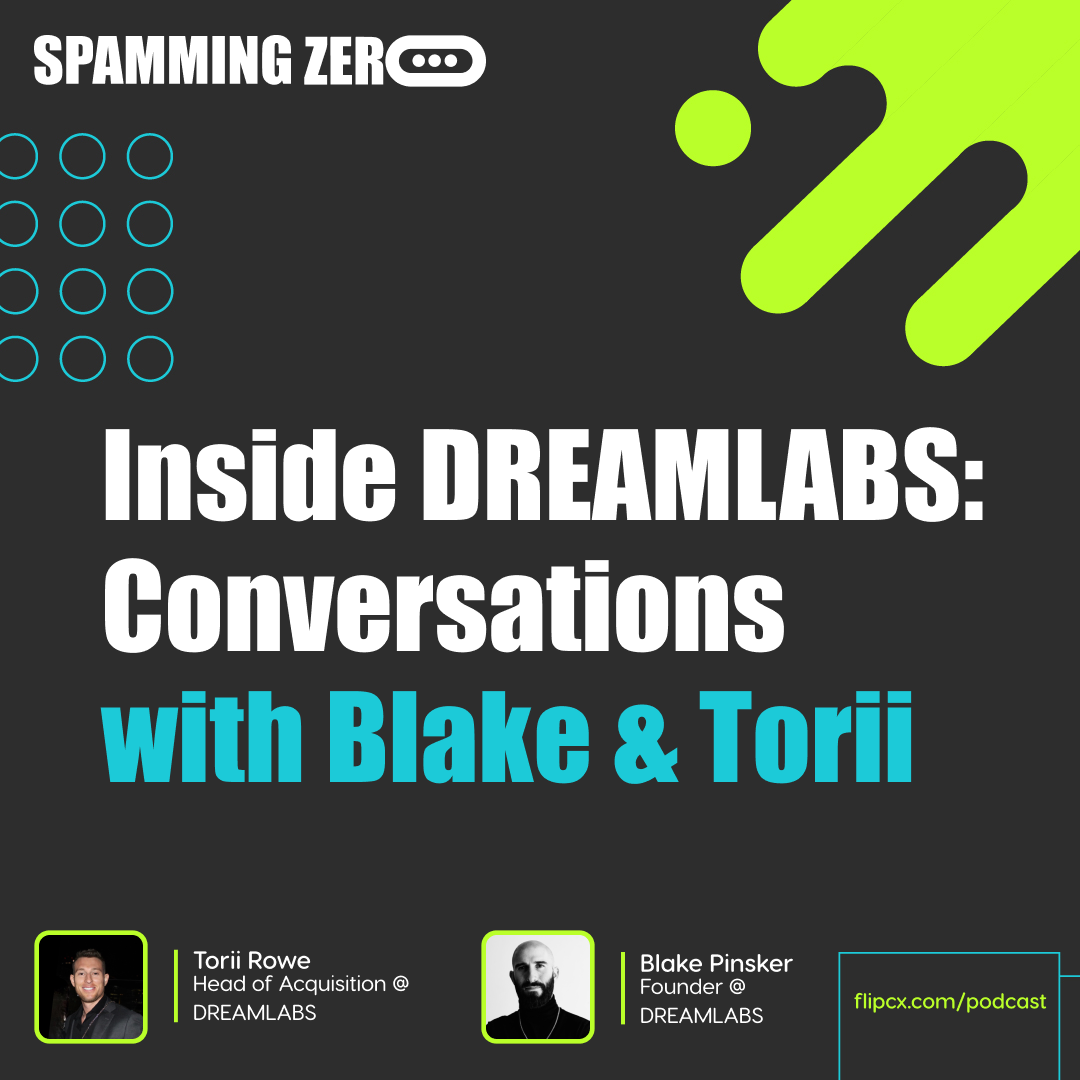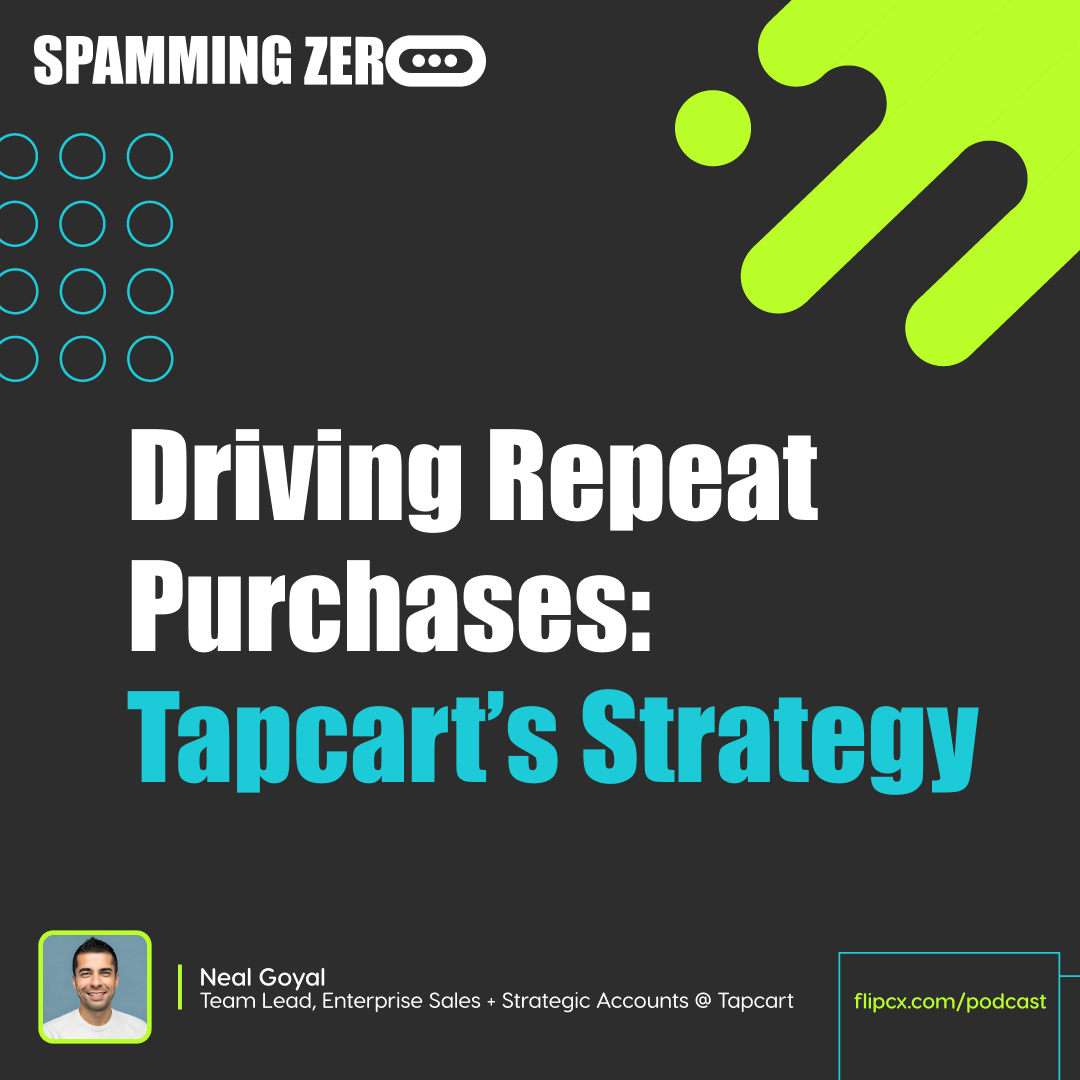Episode 49: How To Avoid the “One Size Fits All” Mindset, with OneSkin’s Jessica-Rose Garcia
- 0.5
- 1
- 1.25
- 1.5
- 1.75
- 2
James Gilbert: Mays's sponsor of the Spamming Zero podcast is ttec. com. T Tec is a customer experience firm that focuses on several different industries, but one in particular is retail and e- commerce. To all of our listeners out there. Their website, again, if you need the phonetic spelling of that, it's Tiger, Tiger, Echo Charlie. com. T Tec. I love what they have on their About Us page, the power of big and the agility of small. They're in a big company, but they have the agility to do a lot just like a small company does. I also love it the fact that they're in six continents, 50 languages. Employees globally is 69, 000, and their client NPS is plus 71. Pretty awesome. Couple of other things about T Tec is they're customer obsessed, digitally empowered, and outcome focused. Some of the CX solutions they offer are customer care outsourcing, so if you need a BPO, they can be your partner. Contact center outsourcing as well as CX solutions and strategy. Reach out to ttec. com. I'm James.
Brian: And I'm Brian.
James Gilbert: And this is Spamming zero. What's up everybody? Welcome to Spanning Zero. I'm your host James Gilbert, and I am joined by Jessica Rose today. Jessica, welcome.
Jessica Rose: Hi.
James Gilbert: Welcome to the show.
Jessica Rose: Oh, I'm so glad to be here, especially with you. I'm so happy.
James Gilbert: So Jessica, tell the audience a little bit about who you are and your experience and what you can bring to the table today.
Jessica Rose: Yeah, so besides dinner, what I can bring to the table. So, I have been working in CS, CX customer spaces for over a decade, specifically in DC e- comm, across different industries and verticals and things like that. But it's definitely my first love, for sure. My fiance jokes, she's always like, " I know I'm always going to be second fiddle," kind of thing, which is really funny because it's all I talk about. Even in my everyday life, things come up and I'm like, " Oh." So, it's really been one of those things that really is the passion of my life, for sure.
James Gilbert: I love it, you remind me... The way that you just responded actually reminds me a lot of a gentleman who we've highlighted on the podcast quite a bit and talked about quite a bit. And his name was Jack Lorenzen. Did you know him?
Jessica Rose: I didn't know him personally, but I, of course, knew who he was, for sure.
James Gilbert: The way that you just responded reminds me of him. That's exactly what he said. That's also exactly what his fiance said, Jack to him.
Jessica Rose: Really?
James Gilbert: To a T.
Jessica Rose: I never knew that. Really? Oh my gosh. In another life. I'm going to cry.
James Gilbert: Well, wasn't the purpose. We're going to have fun on this podcast. So Jessica, I always like to ask people on the show, there's always different things that are happening around us. And what's your hot take right now? What's driving you bonkers?
Jessica Rose: There are two things that are driving me nuts right now and they coexist together when they drive me nuts, if that's the easiest way to say it. The first thing is I think there are so many wonderful voices in the CS, CX space, in the customer space, but I feel like sometimes people, founders, brands, they look at certain people as like a North Star and they're like, " Well, if they're doing it, we have to do it." And I'm a firm believer that there is no one size fits all, and that's super frustrating to me. I have had consulting calls where they're like, " Well... person said this," and I'm like, " That's awesome. We can absolutely do it this way, but from my assessment for you and your brand and your passion and your vision, this is what I'm seeing." And it's like the draw to just follow these LinkedIn posts sometimes, which again, the posts are amazing, the advice is solid, but it doesn't mean it's going to work for you. And it drives me up a wall because I'll see comments and they're like, " Oh, well we're going to do this, we're going to do that." And it's just off of a LinkedIn post. And then with that, part of it is with automation and AI, which is amazing, there are so many instances where it works. I feel like people are just.. I was about to curse, I caught myself. People are just throwing stuff at the wall and a lot-
James Gilbert: You can curse.
Jessica Rose: ... oh,I can? They're just throwing shit at the wall and a lot of shit at the wall, all at once. And what do you get with that? You just have a wall covered in. So, for me, AI and automation is something that you really have to look at and take time. Just with anything foundational for CS, like your training mechanisms with your team, your internal culture, all of these things, your feedback loops. All of these things are... I'm so passionate about really looking at them over and over again. There is a wonderful woman, Brianna, she is the VP of CX at True Classic, and that is her motto, just break it apart every year, look at it and really audit it, and I love that sentiment about her. So, while I think again, AI automation is incredible and can really work, I think having a hundred different things flowing at once is just absolutely breaking the customer experience and in general, failing customers all over the place.
James Gilbert: Oh man, these are going to be some good things that we can dive into. We actually had Brianna on the show a little while ago and she gave us-
Jessica Rose: I am out of the loop. What the heck?
James Gilbert: Yeah, you got to go listen to it.
Jessica Rose: I missed that one.
James Gilbert: It is this amazing framework of how she is getting her agents to be revenue driven and how they measure, it was... Man, I've never seen anything like it. It was so cool. Anyway.
Jessica Rose: Love her.
James Gilbert: I want to dive into this. Let's first start with your first hot take. I myself believe the exact same thing as you. It drives me wild when I hear people say, " You're doing it all wrong," or, " This is the strategy that you need to implement." I absolutely despise it because those of us who have been around a long time and worked in many industries and different roles, know that one size does not fit all. There have been things that I have tried as a CMO and there have been hundreds of other CMOs that swear by it or things that I know work and they swear doesn't and it works, or it doesn't work. So unpack, let's unpack this a little bit. What are some of the biggest things that you hear people say they need to do and you feel like it needs to be more of like, " Hey, you need to be looking at this under the lens of what your organization's pain is and how you can solve it."
Jessica Rose: God, I don't want to call anyone out because again, I think that there are so many great voices and it's not that those things are necessarily wrong, and I'm nervous that if I get too specific, it'll be like, " Well, obviously she's referencing this," but I think it's around that AI and automation is a huge one. I see random numbers being thrown out like, " You should be automating 78.5% of your support organization." And I'm like, " Okay, that's such an interesting number." I've seen 90%. I'll also see scales with as far as offshoring support teams, you need to be 60% internal and whatever. And it's like just let's all take a beat and really sit down and look at what works for us, and I've also... Again, there's different opinions. For instance, phone, I've seen huge things all over LinkedIn that everyone needs to be off phone. Phone is... it's over, it's dead. Which I think in a lot of ways, it's an expensive channel telephony and there are just a lot of different opinions out there. But I've also worked for companies that our demographic was completely, 100%, over 65. Those people needed to be able to call in. It was just, that is the ecosystem. And I would be on the phone... talk about quality over quantity. I'd be on the phone for 45 minutes sometimes just hearing about this person's granddaughter, or grandson, or whatever. And it built this really amazing relationship and ecosystem that I don't think could have existed without having telephony. So, this whole idea of you have to stop doing this, the future is ChatGPT, you knew I was going to say it. ChatGPT is great. I think it's so cool. I saw this really crazy video of this guy who was in a fight with his girlfriend and didn't know how to reply and used ChatGPT and they made up and I thought that was hilarious. I think there are tons of really good use cases, but it's all about the way you use things. Just like anything, our own internal skillsets, I think we all need to take a breath and not just dive full in on all of this stuff, in my opinion.
James Gilbert: Yeah, I agree with you. When we work with our customers, when it comes to AI, on the phone, the way that we like to do it here at Flip, and I don't love to talk about this on the podcast, as many people know that listen to us, but we'd like to break it off into bitesize pieces. You can boil the ocean for sure if you want to. You can go build your homegrown voice solution and do a bunch of flows, and all that fun stuff, which would take six months to do. Or you can do it in bitesize pieces and we always... Right now, we recommend people look, if you're nervous about AI, that's okay, turn on what we call listening mode. So, just have our AI in the background and then it can tell you, " Hey, these are the intents that you're getting. This is what we could do to automate." Two of them out of the hundred that you got today.
Jessica Rose: Yeah, start small.
James Gilbert: Right? And then scale from there. And almost all of our customers start that. So when we see, I think I saw a stat also that was very similar. IBM, I think was the one that gave the stat, and they're like, " 80% of all of your calls should be automated," or 80% of your customer inquiries should be automated. So it's right around the line of what you were running into.
Jessica Rose: It's a random number.
James Gilbert: I know, right? Who did you poll? I hate seeing stats like that because I'm like, " Where's the bias in all of this?" Because there always is, and I'll be real with our audience right now, when it comes to what we do with our customers, a lot of our customers start off and they're automating sometimes only about 10%, 15% of their calls and first month or two and then six months into it, then it's like 25, 30. And we have some customers that have been on our product for two years and they are in a different vertical, so just keep that in mind. But some of them are automating... they are close to 80%, almost 90%, but that's-
Jessica Rose: IBM would be stoked.
James Gilbert: But it's different, right?
Jessica Rose: Yeah, inaudible.
James Gilbert: One, it's a different vertical. Two, AI in general and automation in general, it's got a long ways to go. You know what I mean?
Jessica Rose: I think so too, yeah. I mean to me, if I can't guarantee that automation or that AI is going to get it right every single time, one customer that just is getting a subpar experience is one customer too many to me. So, it's not about controlling the situation every time because I also really believe in just going for stuff sometimes and trying it out and seeing if it works. But at the same time, I see a lot of failed interactions with AI automation, not all the time, but sometimes. But it's also, I think, because of the approach of how it's being implemented.
James Gilbert: 100% and also there is such a bad representation of what automation has done to the customer experience up until this point, right?
Jessica Rose: That's true.
James Gilbert: Everyone has a very, very negative view and rightfully should, about that experience. There is not a single person that I have ever talked to still to this day, that loves calling the phone. So, to go back to your point of how everyone's like, "Oh, just get rid of your phone." Well, let me tell you something. You could get rid of your phone and I would be one of those people that hates you because I would go through your chat and your FAQs and do your self- serve and then find that you didn't serve me at all and I need to call you and then you don't have a phone number, one. And then number two, you're not open when I actually can call you and it's convenient for me, you've forced me down your convenience path. So, it definitely requires a lens to look through and understand, this is what's unique about our business and this is how we can tackle these things. And sometimes the solution's going to be a full... we're going to have all four big channels to be able to support customers. Sometimes it's not going to be.
Jessica Rose: It just depends, exactly that. You hit the nail on the head. It really is, I'm not anti phone, I'm not pro phone necessarily. I'm pro the best path for the customer, for each individual brand and company in those circumstances. So, I mean for me too, when we talk about phone, I think it's also ignorant to be, " Well, death to phone." I think about my fiance who has severe dyslexia. Spelling and reading, she struggles so hard. Her trying to craft an email takes her, I mean, literally 45 minutes, something that could take me three minutes. And she is like, " I just want to call them. I" hear it all the time. She's like, " Why can't I just call them? Can you do this for me?" So, it's like sometimes it just doesn't work for people and it really does depend.
James Gilbert: Jessica, I feel like we are literally on the same wavelength. For the record, Jessica and I have not talked about what we were going to talk about today. This is totally live, folks.
Jessica Rose: I know, at all.
James Gilbert: And I love the fact you brought up this situation because I have been on the rooftops yelling this, and I'll be real with everyone right now. When you get rid of your phone, you just told the majority of the population that you don't care about them. From an accessibility perspective only.
Jessica Rose: Yeah, that's interesting. And that's true. It is. If there's not another way, that if it's only written, you're a 100% right, if the only thing you're offering is written communication, it's true. You really are pushing that off.
James Gilbert: And just to give you a little bit of... don't know how these stats were pulled, but some of the research that I've done on-
Jessica Rose: IBM did a ... just kidding, we're not inaudible.
James Gilbert: It probably wasn't IBM, but there's a lot of research behind the fact that the disability community alone, you think about people like myself who had... I went blind for four years, I couldn't see anything and-
Jessica Rose: Really?
James Gilbert: Oh yeah, this is why I'm really big on voice and really big on the phone because I couldn't do anything with text whatsoever, for a long time and-
Jessica Rose: Am I living under a rock?
James Gilbert: You have a massive amount of the world, by the way, and I say the world because I'm not talking about just the US, that can't read, period. And it's not even related to a disability. It's that they've never been given the proper education to be able to read because they haven't had the resources to do it. So, you're also talking about a massive amount of buying power that exists. And I keep saying this, accessibility is a huge part. We actually had, his name is Josh Basil. He came on and he is probably one of the coolest gentlemen that I've ever met. He's a quadriplegic and he came on and talked about how important voice is, phone, whatever you want to call it, but we call it voice because it's infiltrated in through everything that we do in our lives. And he talked about how important that was. He can't do things even with his own kids without it. He can't type with without it. And there's a loyalty factor to these people. When you provide an option for them, they stay loyal forever.
Jessica Rose: Totally true, beyond true.
James Gilbert: So I love the fact you brought this up, because I was going to weave it in and see what you thought about it.
Jessica Rose: No, it's crazy that you said that too, because my stepdad is quadriplegic too, and he has a lot of tech. He is really on top of it. But yeah, it's the same kind of thing. He just won't buy things if he doesn't have a voice option because it's not... I mean, he literally cannot do anything, but it's just too hard and it's not worth it to him. So, it's a really good point that... I mean, I don't hear conversations happening about this as frequently as they should, so I'm really glad we ended up here, for sure.
James Gilbert: I want to also give the limelight to the text stuff too, because it also serves a part of accessibility that voice doesn't, for those that are deaf, right?
Jessica Rose: Yes.
James Gilbert: And so, I don't want to say if you're a brand out there, you need to have all these options, but you need to figure out how to get them, at least at a certain scale, to provide an option for those that have these issues with support.
Jessica Rose: Yeah, totally.
James Gilbert: Because when you can't provide them, you're losing business and you're losing customers.
Jessica Rose: Yeah, it's a barrier to entry. I mean, your community suffers. You suffer, it's just not... Totally agree.
James Gilbert: Let's dive into the next little hot topic.
Jessica Rose: Yeah, tell me.
James Gilbert: I want to break down something specifically that you mentioned and when you're implementing a new project, whether that's voice, whether that's AI, whether that's a chat bot, whatever the project might be, you mentioned something very specific that I want to dive into and maybe you can give the audience some framework of your own that works really well, but that's training your employees and preparing your staff so that they can manage it. Why is this so important, Jess? Can I call you Jess? Is that all right?
Jessica Rose: You can call me whatever you want. Call me Bob. It's all good, whatever you want. Hardly anyone ever calls me Jess, so it's nice. It can be your own thing. I like it. Why is it so important? I mean, I feel like it's right there. We all know, and if we don't know, I mean, we can talk about it, but agent experience, employee experience is customer experience, period. How your agents are doing, if they have access to information they need, if they are able point blank to do their job easy, as easily as possible, that is going to directly result in the customer experience. But even besides that, what's the point of building this service- centered, at least for me, this service- centered organization, this department that is all about stewardship and service and customer, you have a 98% CSAT, everyone's happy, but internally your agents are miserable. What's the point? I don't see that there is one. And for me, when I look at tools, the customer aspect, yes, does it provide something for the customer? Does it make their life easier? Does it serve them in some way? Absolutely. Great, check that box. But if I look at it and I'm like, is it really hard for the agent to use it? Is it challenging? It's not robust enough, they can't navigate it. That's out of there. I don't care how great it is for the customer, we can't do it. We're just providing roadblocks or for our internal employees and our internal leaders to provide good service outwards. And I really do think it's an ecosystem and it's totally symbiotic within one another.
James Gilbert: I love that. I find it interesting because I actually want to ask a question to our listeners that maybe you can just ask your own teams as they implement new technology. How many of you actually go to your agents and tell them and coach them and, " Hey, we are going to implement a chat bot. This is how it's going to impact you." Or, " You're going to implement this new AI technology and this is how it's going to impact you." You're going to get more complex calls because we're going to automate the easy stuff, so you're... You're going to get more complex calls. Are you trained and ready to be able to answer these calls?
Jessica Rose: Yeah, do you feel comfortable?
James Gilbert: Right. I bet you and the majority of people out there, this could be a very wrong assumption, but I think I might be right. I bet you there's more people than not that don't talk to their agents at all about it and just implement it.
Jessica Rose: For sure.
James Gilbert: And then they try to figure it out along the way.
Jessica Rose: For sure. And that can be hard to... there are some mornings I wake up and this is historical, not necessarily just at OneSkin, but in general, I've woken up and a product has launched, some new technology was added. I knew nothing about it, and it's like... To not to talk about Simon Sinek because I feel like within the CS space and within e- comm in general, I feel like we talk about Simon Sinek a lot, but start with why. For me, I talk about why on the most basic level. I'm rewording a macro, let's talk about why I think that this is going to be more beneficial to get the point across than the old macro. Let's really talk about it. And we have these conversations a lot weekly, sometimes more than once a week, and it really does generate this culture internally within our department and within the company, of just constantly communicating the why behind things. I never am going to be like, " Well, we're doing this because I said so." It just doesn't work. There has to be buy- in. They have to agree. They're not robots, they're people. And if we're going to also... and that's the thing with AI, if we're going to have AI and automation replicate our CS team, right? Okay, what are we replicating? Is there a foundation there of that kind of spirit in the first place, or are we just having these two very seemingly different experiences try to coexist?
James Gilbert: Man, I love everything you're saying on this episode. This is a good one. I want to do something a little different. I am a big believer on our show, and if you've listened to us from the very beginning of when we started Spamming Zero, you can see we are constantly doing things different on the podcast. And the reason why we're doing that is because we want you to come back. We want you to learn what's new that we're going to do. So, we're going to do something that we've never done before on this episode. Are you ready? And we're going to do this more throughout future episodes. We are going to play a couple little games. All right.
Jessica Rose: I love a game.
James Gilbert: Okay, do you know what a Mad Lib is?
Jessica Rose: Yeah. I mean, I don't think I've done a Mad Lib since I was in fifth grade, but I know what they are.
James Gilbert: I'm going to give you a few sentences and I then I want to say blank, and you're going to give me a word or a phrase that first comes to your mind.
Jessica Rose: Okay.
James Gilbert: All right? Let's start with this one. Customer service is blank. Come on, Jess.
Jessica Rose: Customer service is the most important aspect of a brand.
James Gilbert: Boom, all right. The brand experience is blank?
Jessica Rose: Often under- thought out.
James Gilbert: All right, all right, all right, all right. Simon Sinek comes to you and says, " What is your why in your role?"
Jessica Rose: In my role, or in my life?
James Gilbert: In your role.
Jessica Rose: Okay. My why is twofold. My why in my role is to serve anyone that I manage or anyone that I work with on a daily basis to the best of my ability and ensure that their life, their personal life, and their professional life, is as fruitful as absolutely possible. And that our customers are not only getting what they need from us, but they're feeling a deeper connection to our brand why and to who we are on a daily basis and in every interaction.
James Gilbert: Now, what about your personal why?
Jessica Rose: It's similar. My personal why is definitely to walk through life ensuring that every human I come into contact with is left better than when I found them.
James Gilbert: I really like that. That's a good one.
Jessica Rose: Hey, thanks. I got to write it down because you just really made all of this happen. That was hard. Are we done? Can we be done with that? That's hard.
James Gilbert: Nope, nope. Now we're going to switch. It's going to be a new game. Have you ever, I know this is an explicit podcast, but I try to not say the F word too much because my kids listen to this thing. My kids actually listen to my podcast.
Jessica Rose: That's really cute. I love that.
James Gilbert: I know, right? So, I have to be careful with the moments that I have.
Jessica Rose: Hi, James's kids.
James Gilbert: Have you ever played the game? It's called-
Jessica Rose: F, marry, kill?
James Gilbert: Yes.
Jessica Rose: My favorite game.
James Gilbert: How the heck did you know that's what I was going to say?
Jessica Rose: Because you were like, " I shouldn't say the F word." So, that's my favorite game. I love that game. Give it to me.
James Gilbert: Okay, so we're going to do a little bit of a different spin on it to replace the F word we're going to do just sexy. Okay, so what's sexy in customer service? What do you love and what do you hate?
Jessica Rose: Okay, what's sexy? What do I love and what do I hate? I absolutely hate crappy analytics and data funnels, drives me nuts. I hate when a tool will be like, " We're the best. We have all these robust analytics." And then I look at it and I'm like, " This tells me nothing." I love customer feedback beyond, in any shape or form, and not just talking about replying to CSAT, or NPS, or anything like that. I'm talking about in the meat and potatoes of emails, on calls, on chats, whatever it is. I love, love, love, love feedback. Negative feedback, all the same to me. All feedback is great feedback to me. And what do I think is sexy? That's such a funny question.
James Gilbert: Another way to think about it is what do you feel like is the most innovative thing right now in customer service?
Jessica Rose: Ooh, that's a great question. Can I plug a tool that I love?
James Gilbert: Yes, please do.
Jessica Rose: Okay. I also love Flip, and I think Flip is sexy too.
James Gilbert: No, no, no. That's not what I meant by please do.
Jessica Rose: I think Flip is really... I do think Flip is sexy. I love the way that it is, but right now, Hark, sendhark. com. I think Hark is really sexy. That is such a weird sentence. I love it. You really got me there. This is a good trick. If you don't know, Hark uses voice, or sorry, audio and video, to have customers submit customer support issues. And there's just something about it, and I really am such a CX nerd. On the back end when the actual support ticket comes in to the help desk and you have that video or that audio, and there's all this context, I'm just like, " Ooh," it becomes so easy to answer that inquiry. And I really would define that as sexy.
James Gilbert: All right, now we're going to do the Flip, marry, kill about this podcast. Ready?
Jessica Rose: Oh, uh-huh. Anything?
James Gilbert: We might not put this in the actual episode. Who knows? We might cut this part out. It's mostly because I want to know what can we do better on this podcast? What are we doing great? What do you really love? And what do you hate?
Jessica Rose: Okay, let's see. What are you doing great? I love how casual this is and how... In the best way, I mean that. I love how we just ran into it and we're having a conversation. This was not staged at all, right? We just came in and started talking. I love that. I said before we started, " I do this all day." I love talking about this stuff. So it's so great not to have this script where you have to overthink your answers. It's like, I think that's amazing. And it really is more helpful to anyone listening, watching because you get to the actual route. It's not perfect. There's no perfection about it. It's just talking through things. Love that. The next one was, what could you do better? I would love for my background to be blurred. I hate that everyone has to see this really bad... This is my office slash storage room, slash guest room, and there are always people in and out of my house. I'm like everyone's mom. So, would love if this could be blurred. That's not really a you thing though but good to know.
James Gilbert: Actually we might be able to, Katie, make a note of this. Let's see if you can blur it for her.
Speaker 5: If you're watching this and not just listening, you already know, Katie was regrettably not able to blur that background.
Jessica Rose: Okay, sorry. I'm totally lost inaudible. What do I love? What do I hate? What was the third one? What do I like?
James Gilbert: You gave us what would we need to do to improve, and what would you kill?
Jessica Rose: What would I kill off?
James Gilbert: Rapid fire questions.
Jessica Rose: inaudible, no, I'm kidding. Yeah, maybe. I would kill off Mad Libs.
James Gilbert: Okay, we're killing off the Mad Libs folks. This is the first time we've ever done it together.
Jessica Rose: I love a game. I'll play a game all day. But the Mad Libs, I was like... It's Friday, baby, it' Friday.
James Gilbert: It's a little hard. See, and normally I wouldn't actually just do that live with no prep. I would send those-
Jessica Rose: I liked it.
Jessica Rose: No, that's cool.
Jessica Rose: I liked that you just did. It was a challenge, it was fun but I'd...
James Gilbert: Okay, so Jess, couple more questions for you as we come close to the end of the show. I always like to ask all of our guests to tell me about an experience that they've had with a brand that is just crazy amazing. So, tell me about that experience for you.
Jessica Rose: Yeah, I mean, I've had some really, really good ones, but the one that has always stuck with me is Farmer's Dog. They're a dog food company. I love them so, so much. Before I ever had given them to my own dog that I currently have right now, we had a family dog, Schizo, and he had been sick for a while, not really eating. And our parents went off to Italy, my sister was in San Francisco. It was just me at the house. I was watching the dog at our parents' house and they ordered Farmer's Dog thinking, " Okay, he's going to eat it." And it hadn't got there yet. The day before it was supposed to arrive, inaudible died, turned out he had cancer, it was like... I mean, I'm talking, my family came back from Italy. This was beyond devastating to our family. It still is devastating to our family. And of course, that next day after he's gone, this huge box of Farmer's Dog shows up, my mom had spent God only knows how much money on it. I'm going to cry just thinking about it. She's like, " This is ridiculous." And I was like, " I'll just tell them, let's see what they can do." Not only was... it was zero hesitation from them. They were like, " We refunded you. Please donate that to a local shelter," which we actually took a lot of it... There was a homeless encampment very near our house, and we took a lot of it, and we're just every day giving it to the dogs there, since it has to be refrigerated or frozen. So, that was amazing. But they refunded us. They also sent flowers, which I've done this before, but they took it to this other level for me, where I think we got a card from them every two to three weeks checking in, for a couple months.
James Gilbert: What?
Jessica Rose: Like, " We're thinking about you. Naming the Schizo by name, talking to my mom, Katie, being like, " Katie, we're just thinking about you. And we're so sorry that this happened." With just other little notes in there and it really... and we still have all the cards. And it just stuck with me that, first of all, thank you for just refunding it and not making it a big deal. Thank you for sending flowers, so nice. And from boops. com, which is the best. Quick plug for boops.com. And then you follow up and you check in on us by name. It was amazing. And I will always love Farmer's Dog and buy it for my dog for the rest of my life. Not just because it's a great product, but also because of that experience.
James Gilbert: It really is a good product. We've used it a few times with our dogs. We have two little Pomeranians.
Jessica Rose: It is good.
James Gilbert: We like it.
Jessica Rose: Really?
James Gilbert: Yeah.
Jessica Rose: Two little Pomeranians, you say?
James Gilbert: Listen, okay, so it was...
Jessica Rose: I'm not judging you.
James Gilbert: So, my wife, I love her so much. I am not a huge fan of pets in the house. I didn't grow up like that. So, it was an adjustment for me. And we've got four kids too, so it's a lot in the house. Four, can you believe that?
Jessica Rose: Bless you. Bless you.
James Gilbert: And we didn't plan to have any more kids, but my wife had a pretty serious situation with our last kid and being able to have kids anymore is out of the window for her. And so, we got a Pomeranian because it was a way of getting through that, as a little bit of emotional support to help. And then one year for Christmas, she decides to go get another one.
Jessica Rose: For herself, for Christmas? Or for the family?
James Gilbert: For the family.
Jessica Rose: Right, right, right, right. For the family. For you specifically. " James, this is for you."
James Gilbert: So we've got two. They are great. They yap a little more than I'd like, but hey, that's okay. I mean, they're quiet during the podcast, so that's all that matters.
Jessica Rose: I know. It's like, do they know?
James Gilbert: Yeah.
Jessica Rose: See, My dog's the opposite. As soon as I'm on a call or anything, he's like, " Yap, yap." It's like he's waiting for me to be busy.
James Gilbert: All right, so this may be the same answer, but I think it could probably be different too. Tell me about a couple of brands that you just consistently buy things from because you just love it so much.
Jessica Rose: Great, great question. Wow. Chomps, for sure. Love Chomps. They're so easy to work with. I buy from them also because if there's any issue, I know it's going to be fine. Brooklinen, and just has for years, I mean, forever the level of no questions asked, we stand by our product is impeccable to me and they make it so easy to deal with. And then I feel like... I mean I have a lot, but also, I mean OneSkin, no. Monos luggage.
James Gilbert: You can say your own ... You can say your brand, that's okay.
Jessica Rose: Well, I mean we're great, but I'm not going and buying every day. And that was technically the question. And we are great, check us out oneskin. co. But Monos luggage I think would be the other one. They're amazing. I love them. This is the best luggage I've ever had in my life. I hope I'm getting paid for this, this is crazy. But also, their CS is incredible and the stuff's really expensive. One time I had packing cubes, which they don't sound like they're expensive, but they are. And they just never showed up. And they were like, and they not only replace them, but they send double the amount that I ordered. It's like, " Sorry, you had to wait for these and travel without packing cubes." And I was like, " Oh God, it's fine. Thank you so much. It's great. I'm covered for life."
James Gilbert: Oh, I love these examples. This is going to be a really good... This is going to be a good podcast. I'm excited about this one.
Jessica Rose: I feel like you have to cut a lot out. It's going to be me like, " Hi," and then, " Bye."
James Gilbert: Heck no. We're not cutting any of this out. Well actually, I don't know. Katie will decide. But Jess-
Jessica Rose: Fair enough.
James Gilbert: ...you have been amazing on the show. Thank you for joining us. Thank you for bringing your energy.
Jessica Rose: You're the best. Thank you. It's so good to be with you. And this was so fun. So, bring me back.
James Gilbert: Oh, we will. Don't you worry. Stay tuned for next week. We will see you very soon. And if you have not yet subscribed to the podcast, do so. We'd love to hear from you. Let me know what topic you want to hear about. See you next week.
DESCRIPTION
Man, there’s a lot of noise out there right now! When it comes to your CX strategy, it can be overwhelming to know what’s best for YOUR brand - and following the crowd is oh so tempting…
Resist! At least, that’s what OneSkin’s Customer Experience and Support Manager Jessica-Rose Garcia passionately suggests. She joins us to talk CX, automation, employee training, and more. This week, on Flip CX’s Spamming Zero.
What’s Covered?
- A bit about Jessica’s background in CX
- Her hot take around automation and AI
- Finding solutions for YOUR org’s particular pain points
- Our guest’s thoughts re phone as a channel
- The importance of keeping accessibility in mind
- Flip, Marry, Kill - CX style
- Personal experiences that have wowed Jessica
- And more
Ready for more fantastic Spamming Zero conversations ahead? Listen, rate, and subscribe on YouTube, Casted, Apple Podcast, or Google podcasts.
Today's Host
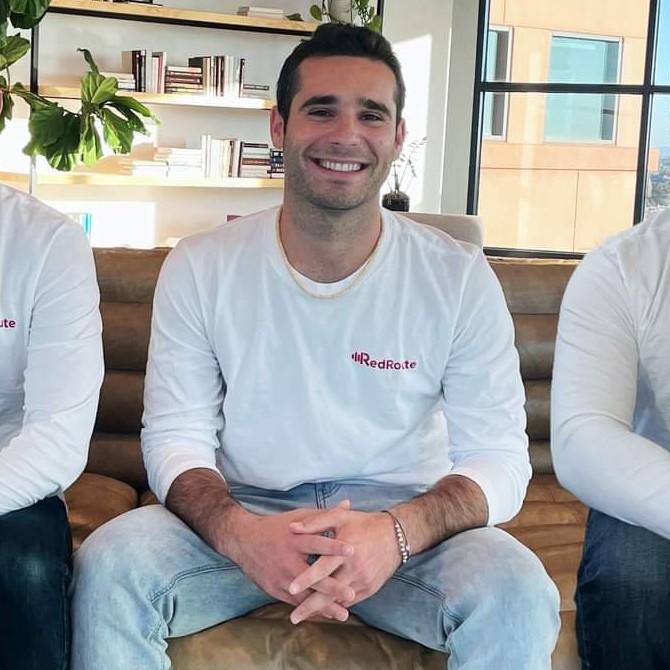
Brian Schiff
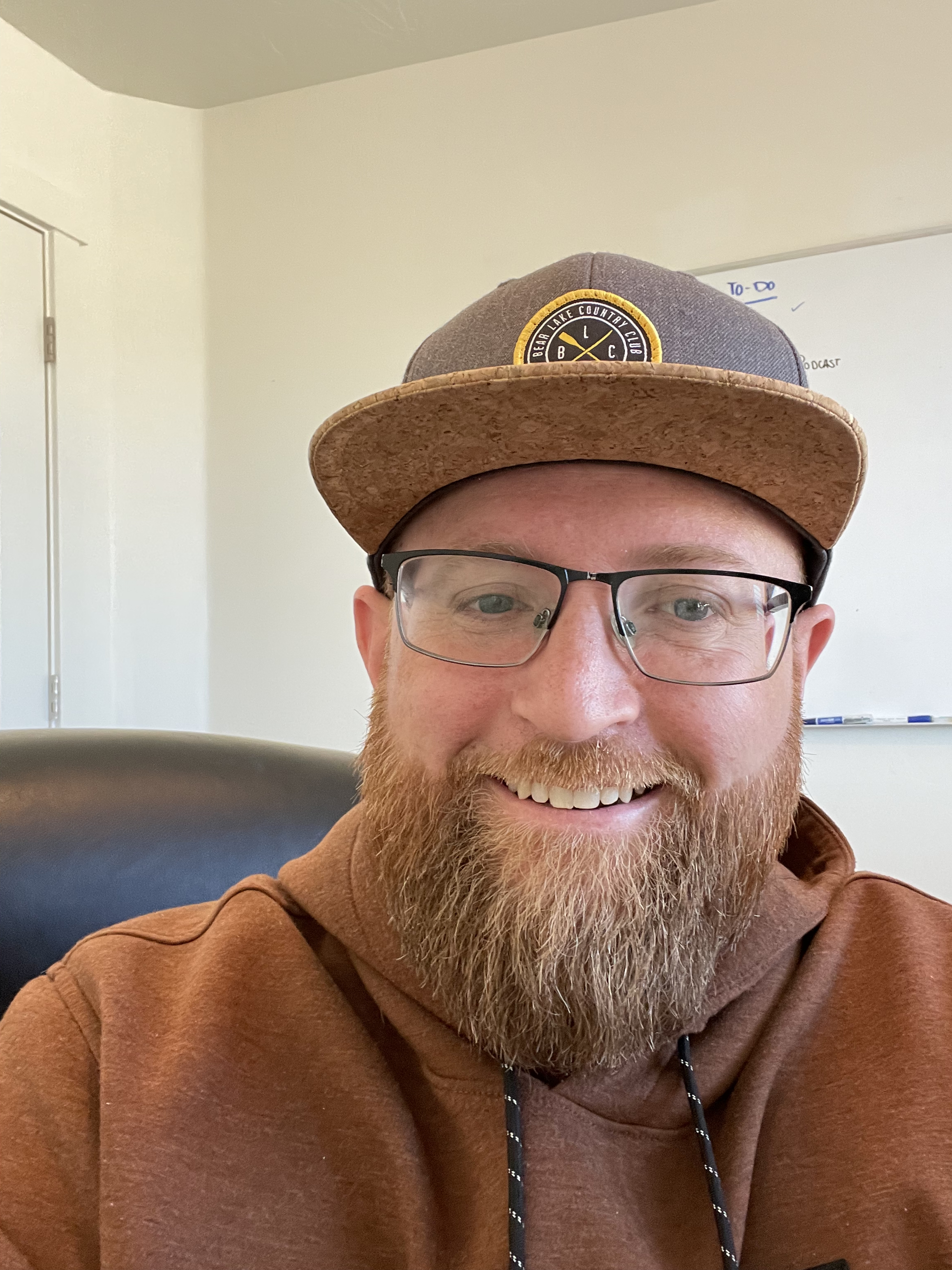
James Gilbert
Today's Guests

